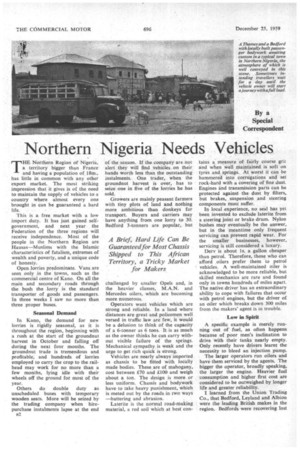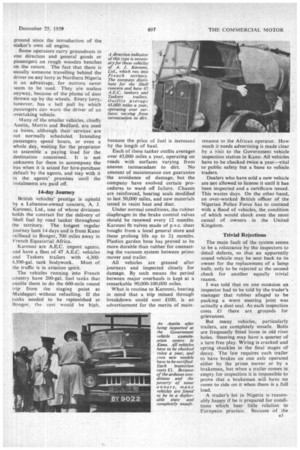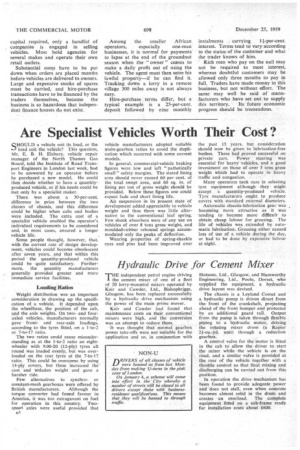Northern Nigeria Needs Vehicles
Page 36

Page 37

Page 38

If you've noticed an error in this article please click here to report it so we can fix it.
By a Special Correspondent
THE Northern Region of Nigeria, a territory bigger than France and having a population of 18m., has little in common with any other export market. The most striking impression that it gives is of, the need to maintain the supply of vehicles to a country where almost every one brought in can be guaranteed a hard life.
This is a free market with a low import duty. It has just gained selfgovernment, and next year the Federation of the three regions will receive independence. Most of the people in the Northern Region are Hausas—Muslims with the Islamic characteristics of fatalism, extremes of wealth and poverty, and a unique code of honesty.
Open lorries predominate. Vans are seen only in the towns, such as the commercial centre of Kano. On all the main and secondary roads through the bush the lorry is the standard transporter of goods and passengers. In three weeks I saw no more than three proper buses.
Seasonal Demand
In Kano, the demand for new lorries is rigidly seasonal, as it is throughout the region, beginning with a rush at the start of the groundnut harvest in October and falling off during the next four months. The groundnut trade is tremendous and profitable, and hundreds of lorries employed to carry the crop to the railhead may work for no more than a few months, lying idle with their wheels off the ground for most of the year.
Others do double duty as unscheduled buses with temporary wooden seats. More will be seized by the trading company when hirepurchase instalments lapse at the end 132 of the season. If the compahy are not alert they will find vehicles on their hands worth less than the outstanding instalments. One trader, when the groundnut harvest is over, has to seize one in five of the lorries he has sold.
Growers are mainly peasant farmers with tiny plots of land and nothing more ambitious than donkeys for transport. Buyers and carriers may have anything from one lorry to 30. Bedford 3-tonners are popular, but challenged by smaller Opels and, in the heavier classes, M.A.N. and Mercedes oilers, which are becoming more numerous.
Operators want vehicles which are strong and reliable. In a land where distances are great and policemen well versed in traffic law are few, it would be a delusion to think of the capacity of a 6-tonner as 6 tons. It is as much as the owner thinks he can carry without visible failure of the springs. Mechanical sympathy is weak and the urge to get rich quick is strong.
Vehicles are nearly always imported as chassis to be fitted with locally made bodies. These are of mahogany, cost between £70 and £100 and weigh about a ton. The design is more or less uniform. Chassis and bodywork have to take heavy punishment, which is meted out by the roads in two ways —battering and abrasion.
Laterite is the normal road-making material, a red soil which at best con
tains a measure of fairly coarse grit and when well maintained is soft on tyres and springs. At worst it can be hammered into corrugations and set rock-hard with a covering of fine dust. Engines and transmission parts can be protected against the dust by filters, but brakes, suspension and steering components must suffer.
In local experience, no seal has yet been invented to exclude laterite from a steering joint or brake drum. Nylon bushes may eventually be the answer, but in the meantime only frequent servicing can Prevent rapid wear. For the smaller businesses, however, servicing is still considered a luxury.
Dery is about Is. a gallon cheaper than petrol. Therefore, those who can afford oilers prefer them to petrol vehicles. A well-maintained oiler is acknowledged to be more reliable, but skilled mechanics are rare and found only in towns hundreds of miles apart. The native driver has an extraordinary ability to cope with failures that occur with petrol engines, but the driver of an oiler which breaks down 300 miles from the makers' agent is in trouble.
Low in Spirit
A specific example is merely running out of fuel, as often happens because of poor men's inclination to drive with their tanks nearly empty. Only recently have drivers learnt the necessity to bleed an injection pump.
The larger operators run oilers and have them serviced by the agents. The bigger the operator, broadly speaking, the larger the engine. Heavier fuel consumption and higher first cost are considered to be outweighed by longer life and greater reliability.
I learned from the Union Trading Co., that Bedford, Leyland and Albion
• were the leading British makes in the region. Bedfords were recovering lost ground since the introduction of the maker's own oil engine.
Some operators carry groundnuts in one direction and general goods or passengers on rough wooden benches on the return. The fact that there is usually someone travelling behind the driver on any lorry in Northern Nigeria is an advantage, for mirrors never seem to be used. They are useless anyway, because of the plume of dust thrown up by the wheels. Every lorry, however, has a bell pull by which passengers can warn the driver of an overtaking vehicle.
Many of the smaller vehicles, chiefly Austin, Morris and Bedford, are used as buses, although their services are not normally scheduled. Intending passengers spend hours, or even a whole day, waiting for the proprietor to assemble a paying load for the destination concerned. It is not unknown for them to accompany the bus when it is seized for hire-purchase default by the agents, and stay with it in the agents' premises until the instalments are paid off.
14-day Journey
British vehicles' prestige is upheld by a Lebanese-owned concern, A. J. Karouni, Ltd., one of whose divisions holds the contract for the delivery of Shell fuel by road tanker throughout the territory. The longest regular journey lasts 14 days and is from Kano railhead to Bongor, 700 miles away in French Equatorial Africa.
Karouni are A.E.C. import agents. and have a fleet of 47 A.E.C. vehicles and Taskers trailers with 4,3004,500-gal. tank bodywork. Most of the traffic is in aviation spirit.
The vehicles running into French country have 200-gal. fuel tanks that enable them to do the 600-mile round trip from the staging point at Maiduguri without refuelling. If the tanks needed to be replenished at Tiongor, the cost would be high, because the price of fuel is increased by the length of haul.
Each of these tanker outfits averages over 45,000 miles a year, operating on roads with surfaces varying from uneven tarmacadam to dirt. No amount of maintenance can guarantee • the avoidance of damage, but the company have evolved certain procedures to ward off failure. Chassis are reinforced, bearing seals modified to last 50,000 miles, and new materials tested to resist heat and dust.
Under normal conditions, the rubber diaphragm in the brake control valves should be renewed every 12 months. Karouni fit valves made of p.v.c. sheet bought from a local general store and these prolong life up to 21 months. Plastics garden hose has proved to be more durable than rubber for connecting the vacuum system between prime mover and trailer.
All vehicles are greased after journeys and inspected closely for damage. By such means the period between major overhauls is kept at a remarkable 90,000-100,000 miles.
What is routine to Karouni, bearing in mind that a trip missed through breakdown could cost £100, is an advertisement for the merits of main tenance to the African operator. How much it needs advertising is made clear by a visit to the Government vehicle inspection station in Kano. All vehicles have to be checked twice a year—vital to public safety but a bane to vehicle traders.
Dealers who have sold a new vehicle are not allowed to license it until it has been inspected and a certificate issued. This wastes days. On the other hand, an over-worked British officer of the Nigerian Police Force has to contend with a flood of vehicles, the condition of which would shock even the most casual of owners in the United Kingdom.
Trivial Rejections
The main fault of the system seems to be a reluctance by the inspectors to detail defects, so that an apparently sound vehicle may be sent back to its owner for the replacement of a lamp bulb, only to be rejected at the second check for another equally trivial reason.
I was told that on one occasion an inspector had to be told by the trader's manager that rubber alleged to be packing a worn steering joint was actually a dust seal. As each inspection costs 1 there are grounds for grievances.
But many vehicles, particularly trailers, are completely unsafe. Bolts are frequently fitted loose in old rivet holes. Steering may have a quarter of a turn free play. Wiring is cracked and spring shackles in the final stages of decay. The laW requires each trailer to have brakes on one axle operated either by the prime mover or by a brakeman, but when a trailer comes in empty for inspection it is impossible to prove that a brakeman will have no room to ride on it when there is a full load.
A trader's lot in Nigeria is reasonably happy if he is prepared for conditions which bear little relation to European practice. Because of the capital required, only a handful of companies is engaged in selling vehicles. Most hold agencies for several makes and operate their own retail outlets.
Substantial sums have to be put down when orders are placed months before vehicles are delivered to owners. Large and expensive stocks of spares must be tarried, and hire-purchase transactions have to be financed by the traders themselves, because the business is so hazardous that independent finance houses do not exist. • Among the smaller African operators, especially one-man businesses, it is normal for payments Lo lapse at the end of the groundnut season when the " owner " ceases to make a daily profit out of using the vehicle. The agent must then seize his lawful property—if he can find it. Tracking down a lorry in a remote village 300 miles away is not always easy.
Hire-purchase terms differ, but a typical example is a 25-per-cent. deposit followed by nine monthly instalments carrying 1-1-per-cent.
interest. Terms tend to vary according to the status of the customer and what the trader knows of him.
• Rich men who pay on the nail may not be required to meet interest, whereas doubtful customers may be allowed only three months to pay in full. Traders have made money in this business, but not without effort. The same may well be said of manufacturers who have set out to supply this territory. • Its future economic progress should be tremendous.
















































































